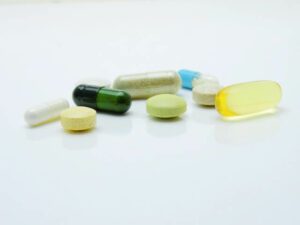Do you feel like you’re missing out on the most enjoyable aspect of sex and want to change that? Do you find yourself losing control before you or your partner are ready? If so, you’re not alone. But what if we told you that the solution to this problem might lie within your own brain? That’s right, we’re talking about neurotransmitters.
You see, these tiny chemical messengers play a crucial role in sexual function, regulating everything from arousal to ejaculation. And if there’s an imbalance in these neurotransmitters, it can lead to issues such as premature ejaculation.
Rest assured, we’re here to provide you with valuable insights and equip you with effective techniques to empower you in managing your sexual health. So buckle up and get ready to learn all about neurotransmitters and how they relate to premature ejaculation.


Definition of premature ejaculation
Premature ejaculation refers to a sexual dysfunction where a man ejaculates before or shortly after vaginal penetration with minimal sexual stimulation and before he wishes to.
This condition is quite prevalent among men and can cause negative personal consequences, such as distress, performance anxiety, and even depression. PE can lead to problems in sexual relationships and can cause a man to actually dread the thought of sexual intercourse, which exacerbates the situation.
Although the precise causes of premature ejaculation are not entirely clear, it is believed to be influenced by both physical and psychological factors. Premature ejaculation can be split into 2 main categories:
- Lifelong premature ejaculation – Lifelong premature ejaculation is a type of premature ejaculation that has been present since a man’s first sexual encounter and has persisted throughout his sexual history. It is also referred to as primary premature ejaculation.
- Acquired premature ejaculation – Acquired premature ejaculation is a type of premature ejaculation that occurs after a period of normal sexual function. It is also referred to as secondary premature ejaculation. This condition can be caused by a variety of factors, such as physical illness, psychological issues, relationship problems, or certain medications.
What are Neurotransmitters?
Neurotransmitters are specialized chemicals. Neurons release these chemicals to send signals to other cells in your body, like muscles or glands. They’re basically like little messengers running around, making sure everything is working properly.
Neurotransmitters have a huge impact on your mood, cognition, learning, memory, and more. It’s fascinating stuff!
There are a ton of different neurotransmitters out there, each with their own unique job. Here are some of the big ones you should know about:
- Acetylcholine: Involved in muscle contraction, attention, learning, and memory.
- Dopamine: Involved in reward and pleasure, motivation, movement, and attention.
- Serotonin: Involved in mood regulation, appetite, and sleep.
- Norepinephrine: Involved in arousal, attention, and stress response.
- GABA (gamma-aminobutyric acid): Inhibits neurotransmission and is involved in anxiety reduction and relaxation.
- Glutamate: Excites neurons and is involved in learning and memory.
Imbalances in neurotransmitter levels can lead to a wide range of neurological and psychological disorders, such as depression, anxiety, Parkinson’s disease, and schizophrenia. As a result, understanding the role of neurotransmitters in the brain is crucial for developing effective treatments for these conditions.
When it comes to male sexual function, neurotransmitters also play a key role, which we will get into next.
Neurotransmitters and Premature Ejaculation
Serotonin, dopamine, and norepinephrine are some of the neurotransmitters involved in sexual function.
How does serotonin cause premature ejaculation?
Serotonin, in particular, is a neurotransmitter that is known to affect mood, appetite, and sexual desire. It also has an impact on the process of ejaculation. When serotonin levels are low, this inhibition or delay may be reduced, leading to premature ejaculation.
During sexual activity, sensory stimuli are transmitted to the brain, which triggers the release of serotonin in specific areas of the brain and spinal cord. This release of serotonin helps to inhibit the activity of certain nerve cells that are involved in the ejaculatory reflex, which is the process that leads to orgasm and ejaculation.
When serotonin levels are low, there may be a reduced inhibitory effect on the nerve cells involved in the ejaculatory reflex, leading to premature or delayed ejaculation. This is why increasing serotonin levels, such as through medication or other methods, can help to delay ejaculation and treat premature ejaculation.
Studies
There have been several studies that have investigated the relationship between serotonin levels and premature ejaculation. These studies have generally found that low serotonin levels are associated with an increased risk of premature ejaculation.
A study published in the Journal of Sexual Medicine investigated the relationship between serotonin levels and premature ejaculation in rats. The researchers found that rats with lower levels of serotonin in their brains had shorter times to ejaculation compared to rats with higher levels of serotonin.
Additionally, clinical trials have demonstrated the effectiveness of selective serotonin reuptake inhibitors (SSRIs) and other medications that increase serotonin levels in treating premature ejaculation. These drugs function by boosting the amount of serotonin in the brain and spinal cord, thereby inhibiting the ejaculatory reflex and delaying ejaculation.
Collectively, these findings suggest that insufficient serotonin levels could contribute to the development of premature ejaculation and that controlling serotonin levels may be a viable treatment for the condition. However, further investigation is necessary to fully understand the mechanisms by which serotonin impacts ejaculation and to create more specific treatments for premature ejaculation.
How does dopamine affect premature ejaculation?
While the precise role of dopamine in premature ejaculation is not yet fully understood, current research suggests that it may be involved in regulating the ejaculatory reflex and could contribute to the development of PE.
Dopamine is a fascinating neurotransmitter that is known to influence reward, motivation, movement, and attention. When it comes to sexual stimuli, dopamine is released in the brain and it has been suggested that this neurotransmitter may play a role in controlling the ejaculation process. Although more research is needed to fully grasp the mechanisms behind the relationship between dopamine and premature ejaculation.
Studies
One study published in the Journal of Sexual Medicine investigated the role of dopamine in premature ejaculation in rats. The researchers found that rats that had a greater number of dopamine receptors in the brain had shorter times to ejaculation compared to rats with fewer dopamine receptors.
Common Neurotransmitter-Based Treatments for Premature Ejaculation
There are several medications for premature ejaculation, which aim to increase the levels of certain neurotransmitters in the brain and improve the regulation of the ejaculatory reflex. Here are some of the common neurotransmitter-based treatments for men who experience premature ejaculation:
Selective serotonin reuptake inhibitors (SSRIs)
SSRIs are often used to treat depression and anxiety, but they can also be effective in treating premature ejaculation. These medications work by boosting serotonin levels in the brain, which can help delay ejaculation and improve your control. Popular SSRIs for treating premature ejaculation include paroxetine, dapoxetine, and fluoxetine.
Tricyclic antidepressants (TCAs)
TCAs are an older class of antidepressant medications that have also been used to treat premature ejaculation. These medications work by blocking the reuptake of serotonin and norepinephrine, two neurotransmitters that are involved in regulating the ejaculatory reflex. Clomipramine is a TCA that has been shown to be effective in treating premature ejaculation.
Phosphodiesterase-5 inhibitors (PDE5 inhibitors)
PDE5 inhibitors are a class of medications commonly used to treat erectile dysfunction, but they can also be effective in treating premature ejaculation. These medications work by increasing the levels of cyclic guanosine monophosphate (cGMP), which can help to relax the smooth muscles in the penis and improve ejaculatory control. Commonly used PDE5 inhibitors for premature ejaculation include sildenafil and tadalafil.
Dopamine agonists
Dopamine agonists are medications that work by stimulating dopamine receptors in the brain. These medications have been shown to be effective in treating several conditions related to dopamine dysfunction, including Parkinson’s disease and restless leg syndrome. Some studies have suggested that dopamine agonists may also be effective in treating premature ejaculation.
While these medications can be effective in treating premature ejaculation, they are not without potential drawbacks.
SSRIs, for example, can cause side effects such as nausea, diarrhea, and sexual dysfunction. TCAs can also cause side effects such as dry mouth, constipation, and dizziness. PDE5 inhibitors, while generally safe, can cause headaches, flushing, and changes in vision. Dopamine agonists can cause side effects such as nausea, vomiting, and hallucinations.
Additionally, these medications may not work for everyone, and they can interact with other medications, so it is important to discuss the potential benefits and risks with a healthcare provider.


Natural ways to raise serotonin levels to help with premature ejaculation
While there are several medications available, some individuals may prefer natural remedies. Fortunately, there are several techniques and exercises that can be used to help raise serotonin levels and delay ejaculation without the need for medication.
These natural remedies may be particularly appealing to those who are concerned about the potential side effects of medications or who prefer to take a more holistic approach to their healthcare.
Diet
Eating a diet rich in tryptophan, such as turkey, salmon, and nuts, can help boost serotonin levels. Other foods that can help increase serotonin include bananas, cheese, and tofu. Incorporating these foods into your diet may be a natural way to help delay ejaculation and treat premature ejaculation.
As well as foods that help raise your serotonin levels there are other natural foods to help with sexual performance that can help prevent early ejaculation.
Practicing mindfulness and relaxation techniques
In addition to reducing anxiety and stress, practicing mindfulness and relaxation techniques can also help increase serotonin levels. Anxiety and stress can often contribute to premature ejaculation, so techniques such as deep breathing, meditation, or yoga can help reduce these feelings and promote relaxation.
By increasing serotonin levels through techniques such as deep breathing, meditation, or yoga, you may be able to improve your ability to control ejaculation through mindfulness and enjoy more fulfilling sexual experiences.
Exercise
Regular physical exercise has been shown to have numerous benefits for both physical and mental health.
A lack of exercise has been linked to premature ejaculation but when we exercise it has been found to increase serotonin production in the brain, which can help to improve mood and delay ejaculation.
A consistent exercise routine can also help to reduce stress and anxiety, which are common contributors to premature ejaculation. So, incorporating regular exercise into your daily routine could be a helpful way to increase serotonin levels and improve your sexual function.


Other natural ways to raise to help with premature ejaculation
As well as natural ways to help raise serotonin, there are plenty of natural techniques to help with premature ejaculation directly.
Pelvic floor exercises
Pelvic floor exercises, such as Kegel exercises are a natural technique that can help improve ejaculatory control and delay ejaculation. The pelvic floor muscles play an important role in sexual function, including the timing of ejaculation.
By strengthening these muscles through exercises like Kegels, individuals may be able to improve their ejaculatory control and delay ejaculation.
Unlike medication-based treatments, pelvic floor exercises are a natural, non-invasive option that can be easily done at home with no significant side effects.
Masturbating before sex
One potential natural method to delay ejaculation is masturbating before sex. This technique is thought to work by reducing sensitivity, which can help increase the time it takes to ejaculate during intercourse.
However, it’s important to note that this technique may not be effective for everyone and could potentially have adverse effects on sexual arousal or enjoyment.
Changing sexual positions
Exploring and finding the best sexual position that works for you and your partner can also help improve ejaculatory control and prolong intercourse.
Some men may find that certain positions, such as the woman-on-top position or the spooning position, allow for more control and less stimulation, which can help delay ejaculation and increase sexual satisfaction for both partners.
Communication with your partner and trying out different positions can be a fun and effective way to address premature ejaculation. And hey practicing to find the best position to make you last longer in bed isn’t exactly the most unpleasant task!
Natural supplements
While prescription medications can be effective in treating premature ejaculation, some people may prefer to explore natural supplements as an alternative.
There are some natural supplements that have been suggested to help with premature ejaculation, such as ginseng, zinc, and Tribulus Terrestris.
One natural supplement that has received attention in recent years is Performer 8, which contains a blend of natural ingredients such as Muira Puama, Horny Goat Weed, and Maca Root. A recent review of Performer 8 found that it may be effective in improving sexual performance and reducing premature ejaculation.
As with any supplement, it is important to consult with a healthcare provider before taking it, especially if you have any pre-existing medical conditions or are taking other medications.
Summary
So there you have it, folks! After exploring the complex world of neurotransmitters and sexual function, it’s clear that there is much more to sex than just physical attraction. As we delve deeper into the inner workings of the brain, we discover the intricate dance of chemicals and signals that contribute to our sexual experiences.
While the topic of neurotransmitters and sex may seem clinical or scientific, it’s important to remember that sexual health is a deeply personal and intimate aspect of our lives. By understanding how neurotransmitters affect our sexual function, we can take control of our sexual health and enjoy more fulfilling experiences with deeper sexual intimacy.
It’s also important to acknowledge that sexual dysfunction, such as premature ejaculation, can be a source of frustration for many individuals. However, with advancements in medication and research, there is hope for those who struggle with these issues.
Ultimately, the role of neurotransmitters in sexual function highlights the interconnectedness of our bodies and minds. By prioritizing our mental and emotional well-being, we can improve our sexual health and overall quality of life.
So let’s continue to explore the fascinating world of brain chemistry and sexuality, and embrace the power of our neurotransmitters to enhance our sexual experiences.
Until next time!












